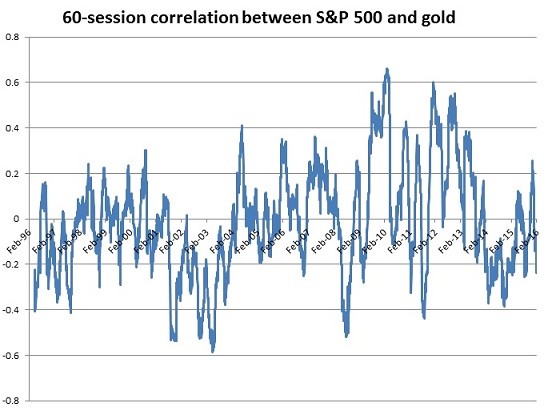If you have been using gold to hedge your stocks portfolio, then you have a problem.
The yellow metal is frequently lauded for its ability offset stock market downturns--and in many cases it does. Indeed, examining the behavior of the broad-market S&P 500 and gold over 60 trading sessions in the month of February would have made you a staunch believer in the myth because the pair had a correlation of negative 0.24, with stocks falling as much as 2-3 percent in some sessions while gold climbed 1.5 percent (-1 indicates perfect inverse correlation).

(Click to enlarge)
Source: CNBC
Yet, the relationship between the gold-stocks pair is anything but straightforward.
Examining the relationship over the past few years reveals a very volatile couple--sometimes running away from one another, other times moving in near-lockstep and many times displaying near-complete indifference.
In fact, zooming out and looking at longer timeframes reveals a disappointing trend: The one-year gold-stocks correlation is a somewhat significant negative 0.121; the five-year correlation is a much weaker negative 0.06 and the 20-year reading is an almost non-existent correlation of negative 0.03.
According to FactSet, over the past 20 years there have been 23 weeks when gold climbed a mere 0.16 percent, despite stocks falling five percent or more (a really bad sell-off).
Other Factors at Play
So, why does gold frequently display such indifference to stock movements? Because there are other factors at play.
In the most recent period, gold has become a less effective hedge for stocks mainly because a stronger dollar has been acting as a strong headwind. The greenback has been growing stronger due to QE tapering by the Fed, which has lowered money supply, higher interest rates and political instability leading to weaker currencies. Resurgent political risk in the Eurozone has in particular been making the dollar look stronger and, hence, acting as a major headwind for gold prices. Related: Groundbreaking Deal Opens The Mega-Merger Floodgates
Gold is therefore better used as a “portfolio paperweight” that refuses to bow to equity market moves rather than a straight-up hedge for stocks.
Other Hedging Strategies
If you are wary of the equities markets, you can partially or entirely offset a long stock position using assets like stocks or convertible bonds. If you need something a bit more unorthodox, try:
• The U.S. Dollar-- having a solid cash allocation is a pretty effective way to lower the volatility of your portfolio. Specifically, use a dynamic cash hedge that raises your cash allocation during falling markets and lowers it when markets are rising. You need to use stop loss orders to create a dynamic cash hedge.
• Become a contrarian investor-- remember The Big Short? Those Wall Street fund managers made a bundle by betting against the housing market during the housing bubble of 2008. You can likewise bet against certain sectors of the market and profit from it by buying reverse ETFs.
• Optional investing-- you can hedge your stocks portfolio using put options or by using futures contracts to create a synthetic hedge. Money managers tend to favor optional hedging.
• Diversify your portfolio--this is not exactly a hedging strategy, though it does help. Especially when you are bold enough to go off the beaten path--holding 10-30 percent of your portfolio in 'exotic' investments including private equity, secured floating income debt portfolio, opportunistic real estate investments (not funds or stocks) and Absolute Return portfolios.
By Alex Kimani for Safehaven.com
More Top Reads From Safehaven.com:

















All market participants are interested in preserving their wealth and a significant drop in the equities markets might result in more investors wanting to own physical gold. What cannot be understood about that dynamic? So while the dollar price of gold might not rise (or even fall) .. it will not fluctuate (upward or downward) nearly as much as what we will see in the equity markets as billions of dollars in phantom capital disappear in days/weeks. This make gold the perfect hedge.
Yeah good luck with your graphs in a completely manipulated market the keeps digging a short hole for itself.
Oh and BTW - why can't Scotiabank sell its PM trading desk? Could it be a massive short position that no one wants to touch? This paper scam is falling apart and Scotiabank's dilemma shines a light on the problem.